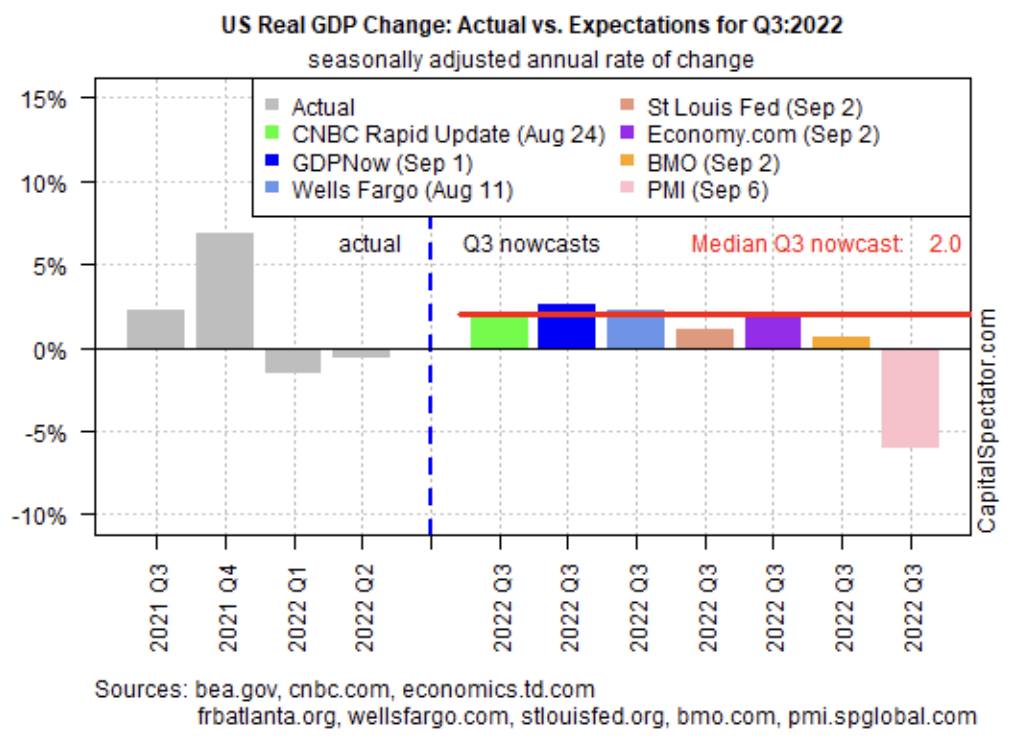Revised numbers for US economic activity in the third quarter point to a slightly stronger recovery vs. the previous update, based on the median estimate for a set of nowcasts compiled by CapitalSpectator.com. The upbeat profile still deserves to be viewed cautiously, in part because of a hefty negative outlier in the nowcasts. But for now, the overall profile suggests that the economy may be set to rebound in next month’s release of Q3 GDP data from the Bureau of Economic Analysis.
The caveat (still) is a deeply negative estimate via PMI survey data. The US Composite PMI is considered a GDP proxy, and the current report reflects a sharp decline in US output for August. (Note: the raw PMI data is converted to GDP nowcasts via a regression model designed by CapitalSpectator.com.) Otherwise, moderately positive estimates dominate at the moment. Using the median points to a 2.0% increase in Q3 GDP (seasonally adjusted annual rate).

If the median nowcast is accurate, US economic output will increase for the first time this year, based on quarterly GDP numbers. Meanwhile, the current +2.0% rise is slightly higher vs. the +1.6% estimate from two weeks ago.
The latest PMI survey data for August, however, begs to differ. Chris Williamson, chief business economist at S&P Global Market Intelligence, which publishes the PMI data, says:
“August saw the US economy slide into a steepening downturn, underscoring the rising risk of a deepening recession as households and business grapple with the rising cost of living and tightening financial conditions.
Businesses are reporting a deterioration in output and order books of a degree exceeded since the global financial crisis only by that seen during the initial pandemic lockdowns.”
CNBC reports that economists overall are divided on the US economic outlook:
“Recent surveys reflect the split. A Reuters poll of economists in late August put the chance of a US recession within a year at 45% (with most saying one would be short and shallow), and a Bloomberg survey put the probability of a downturn at 47.5%.”
Part of the reason for the disagreement is linked to preferences for modeling economic activity. Emphasizing the labor market input, for example, paints a relatively upbeat profile. Hiring remains robust, and job openings are high, suggesting that the near-term outlook for the economy remains positive.
Yet there are a number of darker factors lurking, including high inflation and hawkish monetary policy that’s focused on taming pricing pressure. Deciding how much these factors will play out and which ones will dominate is creating a divergent set of forecasts.
Alexander Nutzenadel, professor of social and economic history at the Humboldt University of Berlin, tells CNBC:
“We live in a period of multiple shocks—from COVID-19 over energy prices to political deglobalization—which make predictions extremely difficult.”
Meanwhile, a key question in the weeks ahead: Will the median Q3 GDP nowcast persist?
The next major clue is next week’s August data on US consumer inflation. If pricing pressure shows more signs that inflation has peaked, the Federal Reserve may feel comfortable slowing its rate-hike plans and thereby reduce macro headwinds. By contrast, a stronger-than-expected CPI report will imply the opposite effect.
